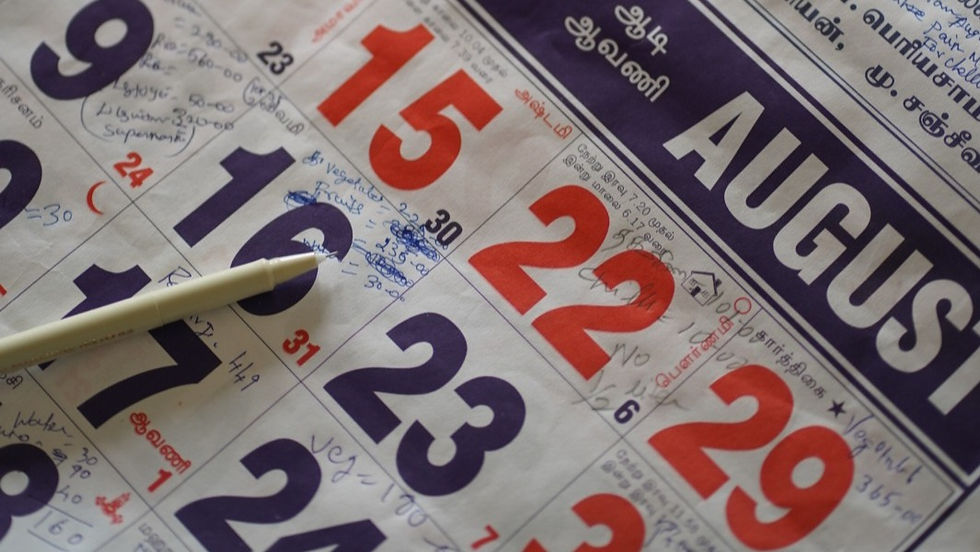From Dates to Days: Navigating Our Weekday-Centric World
- Sandhya madhuri Hota

- Apr 27, 2024
- 3 min read

Remember the days when, as students, we diligently scribbled down the date at the top of our notebooks, class after class? That ritual—repeating the date eight times a day—somehow etched those numbers firmly into our minds. Fast forward to today, and many of us find ourselves in a peculiar quandary: while we can effortlessly recall what day of the week it is, the actual date often eludes us. This shift, from dates to weekdays, marks a significant change in how we interact with time in our digital age.
In our contemporary rush, waiting eagerly for the weekend and celebrating the arrival of Friday with the famous "Thank God It's Friday" (TGIF) mantra, we've adapted to a weekday-centric perception of time. This focus is so ingrained that when someone abruptly asks for the date, a pause ensues, followed by a hurried glance at our smartphones—our modern-day wall calendars long relegated to nostalgia.
This evolution in how we perceive time comes with its set of challenges, especially when it comes to planning and scheduling events. Given our tendency to align events with weekdays rather than dates, emphasizing both in event invites becomes not just a convenience but a necessity. It serves as a bridge between our current weekday-focused mental calendar and the traditional date-centric approach, aiding in smoother event planning and reducing the anxiety around forgetting significant dates.
Why Weekdays Reign Supreme
Our cultural pivot towards living for the weekend has subtly trained us to monitor time through weekdays. This isn't without consequences. The anxiety of forgetting key dates like birthdays or anniversaries is a common concern, leading many to repeatedly check calendars to avoid missing out on important celebrations. This cycle of checking and rechecking speaks volumes about our current relationship with time—a relationship that, while efficient, sometimes keeps us at arm's length from the personal touch of remembering dates.
In acknowledging this shift, it's clear that the way we communicate about events needs to adapt. Mentioning both the weekday and the date in invites can cater to our preference for weekdays while ensuring the actual date is not overlooked. This method not only facilitates better planning but also resonates with our intuitive understanding of time, making it easier to remember and prepare for upcoming events.
By adopting this dual approach, we aim to blend the convenience of digital scheduling with the personal mindfulness of remembering important dates. It's about striking a balance between leveraging the tools at our disposal and maintaining the personal connection that comes with commemorating the significant moments in our lives and the lives of those around us.
In this digital age, where technology often dictates the rhythm of our lives, reminder and event scheduling apps play a pivotal role. These apps, if designed with our weekday-centric preferences in mind, could revolutionize how we manage time and remember important dates. A design that emphasizes not only the date of an event but also the day of the week could serve as a powerful tool in aligning with our natural inclinations and reducing the stress associated with forgetting dates.
Imagine an app that not only sends you a reminder a few days before your friend's birthday but also integrates seamlessly with your weekly flow, highlighting how the event fits into your typical week. Such an app could cater to our preference for visualizing time in chunks (weekdays) and ensure we're better prepared for upcoming events without the need for constant rechecking.
Furthermore, these apps could incorporate features that allow for a more intuitive understanding of time. Visual calendars that highlight the relationship between dates and weekdays, reminders that contextually reference the day's activities, and scheduling tools that prioritize ease of use and integration with our daily routines can all contribute to a more harmonious relationship with our calendars.





Comments